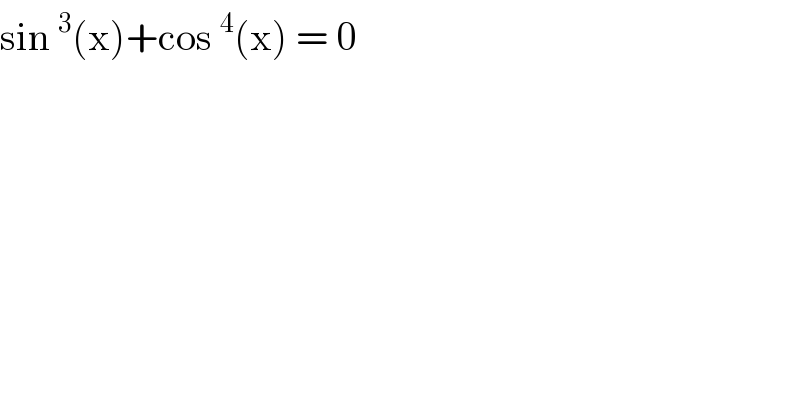Question Number 92399 by jagoll last updated on 06/May/20

$$\mathrm{sin}\:^{\mathrm{3}} \left(\mathrm{x}\right)+\mathrm{cos}\:^{\mathrm{4}} \left(\mathrm{x}\right)\:=\:\mathrm{0} \\ $$
Commented by john santu last updated on 06/May/20
![sin^3 x + (1−sin^2 x)^2 = 0 [ sin x=p ] p^3 +p^4 −2p^2 +1 = 0 ⇒p^4 +p^3 −2p^2 +1 = 0 use Ferrari′s method](https://www.tinkutara.com/question/Q92400.png)
$$\mathrm{sin}\:^{\mathrm{3}} {x}\:+\:\left(\mathrm{1}−\mathrm{sin}\:^{\mathrm{2}} {x}\right)^{\mathrm{2}} \:=\:\mathrm{0} \\ $$$$\left[\:\mathrm{sin}\:{x}={p}\:\right] \\ $$$${p}^{\mathrm{3}} +{p}^{\mathrm{4}} −\mathrm{2}{p}^{\mathrm{2}} +\mathrm{1}\:=\:\mathrm{0} \\ $$$$\Rightarrow{p}^{\mathrm{4}} +{p}^{\mathrm{3}} −\mathrm{2}{p}^{\mathrm{2}} +\mathrm{1}\:=\:\mathrm{0} \\ $$$${use}\:{F}\mathrm{errari}'{s}\:\mathrm{method}\: \\ $$
